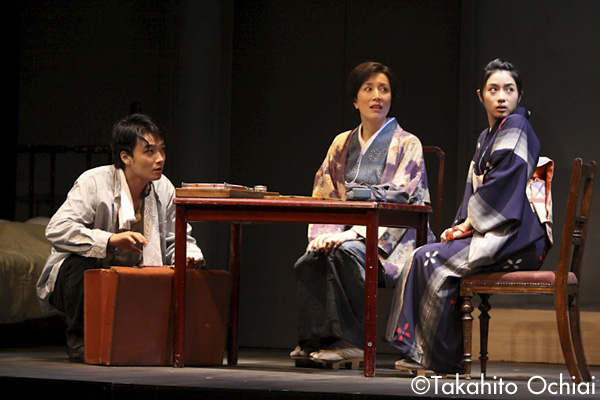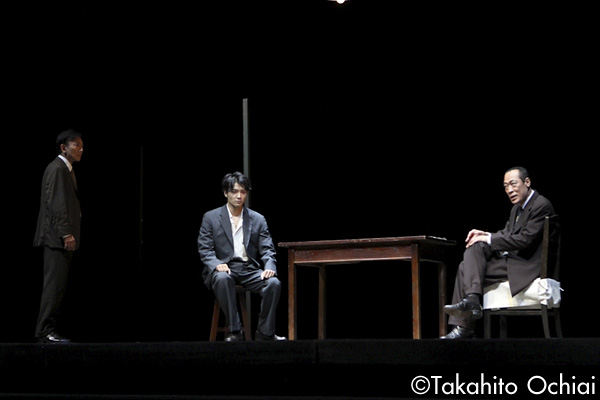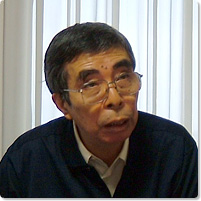The play’s Prologue begins with six actors singing the song “Daiyo pan” (cheap “substitute bread” roles with sweet beans inside) in chorus. As a child Takiji is living and working at his uncle’s Kobayashi Mitsuboshi-do (Three Star) Bread Store, the large bread store in the city of Otaru. His uncle has always been condescending toward Takiji’s family and uses them to his own profit. As he works there, Takiji begins to wonder why it is only the cheapest of the store’s breads, the daiyo pan, that goes unsold. Eventually, he becomes of aware of the machinations of society that steal from the poor even the pennies to buy cheap Daiyo pan and he sings the song with the passion of one determined to protest the contradictions and cruelties of society.
Fourteen years later, the scene is an interrogation room in the Shimanouchi Police Station near Osaka’s Dotonbori moat. The Special Police detectives Furuhashi and Yamamoto enter. The night before, Yamamoto had infiltrated a lecture by the communist magazine
Senki
(Battle Flag) and arrested the lecturer, who is supposedly Takiji Kobayashi. But the suspect he has arrested refuses to talk. Furuhashi is a successful detective who has made a name for himself rounding up communists in Kobe. The two detectives begin their questioning of the suspect.
The suspect refuses to break under the detectives’ threats and intimidation and only begins to talk when Furuhashi brings up the names of his family and his uncle. Thus his true identity as [the proletarian movement writer] Takiji Kobayashi is revealed. With composure and no signs of guilt, Takiji begins to talk about the hard days of his youth as a penniless dependent [of his uncle]. Drawn in by Takiji’s honesty, Furuhashi and Yamamoto also begin to talk of their own memories of youth. Soon returning to their senses, however, the detectives tell Takiji that he had better return to writing regular novels and stop his proletarian writing. As an expression of the indignation at the large number of words censored out of writings by political censors, Takiji sings the
Fuseji
(Censored word) Song. This brings him a whipping with a thick rope as torture.
A month later, the scene is the rented home of the Proletarian Writers Alliance member Nobuyuki Tateno in the Narimune neighborhood of Tokyo’s Suginami-machi. We see Fujiko Ito cleaning the room. Takiji’s older sister, Chima Sato, who has received a letter from Takiji, arrives along with Takiji’s fiancé, Takiko Taguchi.
Fujiko introduces herself as someone who came to Tokyo to study painting became acquainted with Tateno while working as a theater backdrop scene painter and is now a member of the proletarian movement. Listening to Fujiko tell how she is now taking care of Takiji like a wife arouses a fit of jealousy in Takiko. But as they talk of their situations, their spirit gradually becomes one and they look up at the moon as they sing together the song “
Toyotama no Hikui Tsuki
(Low Moon over Toyotama).
At that point, detectives Furuhashi and Yamamoto arrive incognito, but Fujiko quickly recognized the attempted deception. With some quick thinking, Fujiko manages to relay a message to the front door to prevent Takiji from coming home, but she is clearly troubled by the knowledge that is arrest is imminent.
Six months later, Takiji is in a solitary cell in Toyotama Prison. Alone in solitary with no one to talk to, Takiji keeps up his spirits by singing his “Love Song from a Solitary Cell” into a hand mirror for all the young girls toiling in the spinning mills and the young wives whose husbands have been imprisoned and all the others who still manage to remain pure and gentle of heart despite their poverty.
Seven months later, Takiji has been released from prison and is living in a rented house in the Mabashi neighborhood of Suginami-machi. His sister Chima pays a visit. Their mother has come to Tokyo in preparation for coming to live with Takiji. Detective Yamamoto is in a 3-mat room [in the house]. He and Furuhashi are taking turns living there as part of the Special Police department’s latest strategy of keeping the communists under full-time observation. Fujiko, who is now working at a newspaper as Takiji’s manuscript runner, comes home, followed a little later by Takiko.
The next to come to Takiji’s full house is detective Furuhashi, and he brings some mail with him. In it are a letter from an avid fan of Takiji’s and a manuscript for a novel with a letter from its author begging Takiji to recommend it to a publisher. Both of these are fabrications of the detectives in their attempt to trick Takiji into incriminating action. But there is a strange feeling of mutual understanding between Takiji’s people and the detectives as they all sing together a “
Gamaguchi
(Coin Purse) Song.”
Ten months later, in an empty lot near Tokyo’s Shinjuku district, Furuhashi and Yamamoto sing a “Pavlov’s Dog” song that says they are loyal watchdogs of the nation. They have been taken off the Takiji case for being to easy on him. They continue to sing as if telling themselves to redouble their efforts for the country.
Four months later, Takiji and Fujiko are using an apartment in the Azabu district of Tokyo as a base as they conduct underground activities for the movement. After saying the password from the other side of the door, Fujiko enters with Chima and Takiko. Hearing that Takiji has been cut off from his funding source, Chima has come to chip in. For a brief moment Takiji experiences familial warmth again. With his will to pursue his mission renewed, Takiji sings “
Shinjite Hashire
(Believe and Push On).
After seeing off the two, Fujiko does some shopping and returns to the hide-out. What she has in her hand is a wig for disguise. Just then the two detectives Furuhashi and Yamamoto burst in. Quickly putting on the disguise wigs, Takiji and Fujiko pretend to be singers rehearsing a song. They succeed in fooling the detectives, who leave the room. Taking advantage of the moment the two fugitives managed to escape out the window.
Two months later. In order to arrange a secret meeting between Takiji and Chima, Fujiko and Takiko have disguised themselves as waitresses at the Parlor Yamanaka in the Azabu-juban commercial district and await their arrival. But word of the meeting has already leaked to the police and detectives Furuhashi and Yamamoto are waiting in the next room disguised as college cheer team members. Finally Chima arrives disguised as a female masseuse and Takiji comes in the costume of a Chaplin sandwich board man.
But just when it looks like the action is about to begin, Yamamoto begins telling a disgruntled Furuhashi that he wants to hold off on the arrest until he can have Takiji criticize and make some corrections in a novel Yamamoto has written. It just isn’t the tense arrest scene it should be. Takiji begins telling Yamamoto that, “To write a novel, you have to throw your whole body and soul into it. If you can do that, then the movie projector of the heart begins to project and the precious scenes that only that person has seen will appear on the manuscript paper like shining silver.”
Coming together as if to warm each other, they begin to speak of “precious scenes” and all join in singing the “Movie Projector of the Heart” song.
Three months later it is a night at the end of February. Takiji has already died under torture by the Special Police and his funeral ceremony is over. Chima is making preparations to take their mother back to Otaru, and Takiko is helping. Suddenly, detective Yamamoto shows up and begins to report everything that happened from the time of Takiji’s arrest until his final moments.
When the story reaches the point where the torture begins, Chima becomes frantic. She had already seen all the things the police did to her brother as she was cleaning the body for the funeral and she tells Yamamoto that now since he has come to see them in this way, she is satisfied and he needs to say no more.
As Yamamoto leaves, Furuhashi enters. He tells them that Yamamoto has started a nationwide patrolman’s union and has been handing out leaflets in the police headquarters, adding before he leaves that in the worst scenario Yamamoto himself may be arrested soon. Chima and Takiko look at each other. As they begin to walk off with an air of strength and determination the words of the song “Movie Projector of the Heart” are heard.




